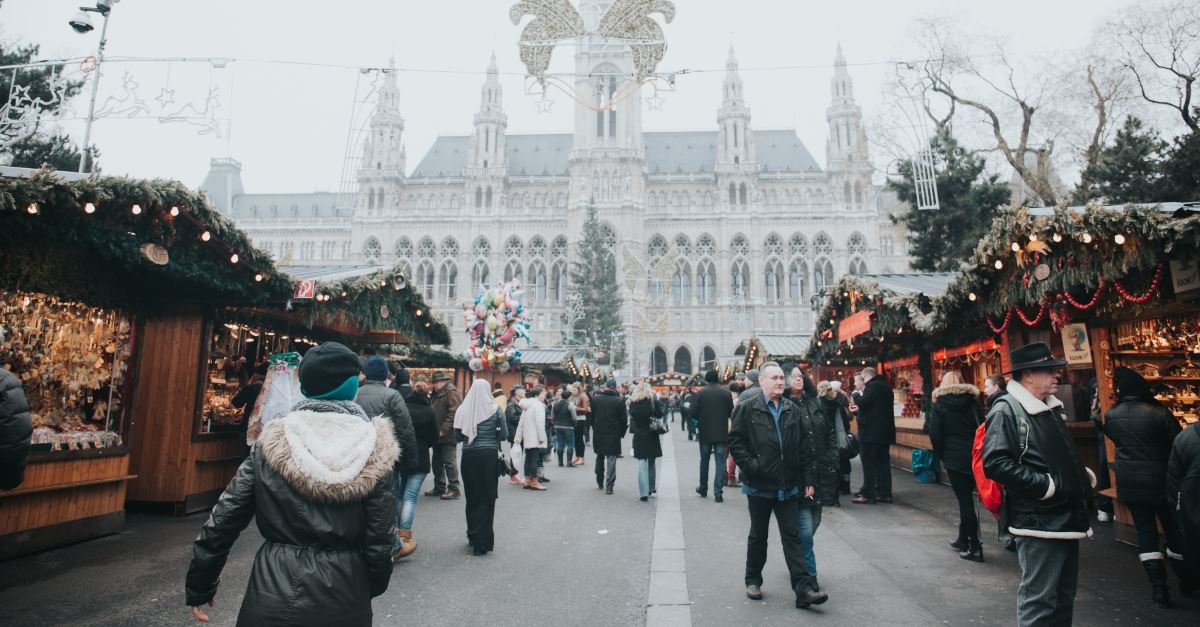
Advent is a special time of anticipation as we wait for the commemoration of the birth of the Christ child. Many people throughout the western world know and celebrate Christmas, but Advent isn’t always observed the ways Christmas is. The word Advent was borrowed from the Medieval Latin word adventus, and it means “coming” or "arrival, appearance.” The four weeks leading up to Christmas is a very special time, especially, for instance, in the country of Germany.
But our citizenship is in heaven. And we eagerly await a Savior from there, the Lord Jesus Christ. (Philippians 3:20)
Advent is a special time of anticipation as we wait for the commemoration of the birth of the Christ child. Many people throughout the western world know and celebrate Christmas, but Advent isn’t always observed the ways Christmas is. The word Advent was borrowed from the Medieval Latin word adventus, and it means “coming” or "arrival, appearance.” The four weeks leading up to Christmas is a very special time, especially, for instance, in the country of Germany.

Photo Credit: Unsplash/Alisa Anton
Advent Celebrations in Germany
Germans start celebrating as early as late November by creating or buying an advent’s wreath (Adventskranz), which includes four or sometimes five candles, to be lit each of the four Sundays leading up to Christmas. If there is a fifth candle, it is lit on Christmas Eve. The lighting of the candles is often accompanied by a devotional Bible reading or singing of carols. Germans also display handmade wooden nativities (Krippen) in their homes. Many of their celebrations are recognizable as the traditions brought over to America by European immigrants.
Preparation: Remembering, Hoping, Expecting
German Christians don’t just wait—they prepare. The four Sundays of Advent are an intentional time of preparation and anticipation in both the state churches (Catholic and Lutheran) and many free churches (Baptist, Pentecostal, Methodist, etc.) in Germany. The first candle on the advent wreath is often referred to as the candle of hope. So, on the first Sunday of Advent, church services focus on the hope we have in Christ. The second candle is the candle of love, the third, the candle of joy, and the fourth, the candle of peace.
Each Sunday of Advent highlights these “gifts” that we possess because Christ came to earth. In this way, the Germans have something to teach us about waiting. The Advent time isn’t just passed by; it is spent remembering, hoping and expecting, with eyes on the Savior!

Photo Credit: Unsplash/Julian Hochgesang
Advent’s Challenge for Focus over Distraction
As idealistic as that sounds, just like in America, the Christian meaning of Advent is far too often overshadowed in Germany by secular customs and celebrations. Germans typically enjoy advent calendars (Adventskalendar) more for the chocolate and toys inside than the symbolism involved in opening each tiny door and counting down to Christmas. They bundle up in heavy coats, gloves, hats and scarves, and flock to the many festive Christmas markets (Weihnachtsmärkte or Christkindlmärkte), far more concerned with the colorful stalls selling gingerbread, mulled wine, nutcrackers and ornaments than with the centrally located nativity scene.
Quite frankly, it requires conviction, focus and determination to keep our eyes on Jesus during the Advent and Christmas seasons, even if we attend churches that help us do that. Scripture urges us to eagerly await our Savior’s return, but we are so often distracted, and this isn’t just a struggle during the month of December; it’s a life-long challenge to live in view of the first and second comings of Christ.

Photo Credit: Pexels/Jeswin Thomas
Advent Teaches Us to Look for Christ’s Second Coming
You see, there are two Advents. There was the first Advent, or “coming” of Christ as a baby, born to the virgin Mary, but this same Christ is coming again a second time! Just as we eagerly await His first coming during the month of December, we should always be awaiting and anticipating His second coming prophesied in Acts 1:10-11, among other passages:
They were looking intently up into the sky as he was going, when suddenly two men dressed in white stood beside them. “Men of Galilee,” they said, “why do you stand here looking into the sky? This same Jesus, who has been taken from you into heaven, will come back in the same way you have seen him go into heaven.”
Eagerly awaiting our Savior must include preparing for His return.
So you also must be ready, because the Son of Man will come at an hour when you do not expect him. (Matthew 24:44)
And now, dear children, continue in him, so that when he appears we may be confident and unashamed before him at his coming. (1 John 2:28)
He gave us a task to be about while we wait, and that task is making disciples.
Therefore go and make disciples of all nations, baptizing them in the name of the Father and of the Son and of the Holy Spirit, and teaching them to obey everything I have commanded you. And surely I am with you always, to the very end of the age. (Matthew 28:19-20)

Photo Credit: Getty Images
Advent Turns Our Eyes toward Our True Home
Most of the world is too distracted to see the Savior. We cannot be part of the solution if we’re part of the problem. Lay aside everything that hinders and distracts, and fix your eyes on Jesus (Hebrews 12:1-2).
As Philippians 3:20 reminds us, citizenship has everything to do with how successfully we “await” our Savior. If we live primarily as citizens of earth (America, Germany, or any other country), which so many of us do, we will be distracted. Our focus will be on what is seen, or temporary – our earthly homes. If we live as foreigners and strangers on earth (Hebrews 11:13), understanding that our citizenship is in heaven, our focus will be on the eternal.
But our citizenship is in heaven. And we eagerly await a Savior from there, the Lord Jesus Christ. (Philippians 3:20)
Use this Advent season to refocus on your true, heavenly citizenship and eagerly await your Savior!
Kristi Walker has been a missionary in Berlin, Germany for over 15 years working with an international church as the Director of Student Ministries. She is the author of two books - Disappointment: A Subtle Path Away from Christ and Convinced. Applying Biblical Principles to Life’s Choices.
Photo Credit: Unsplash/Annie Spratt







